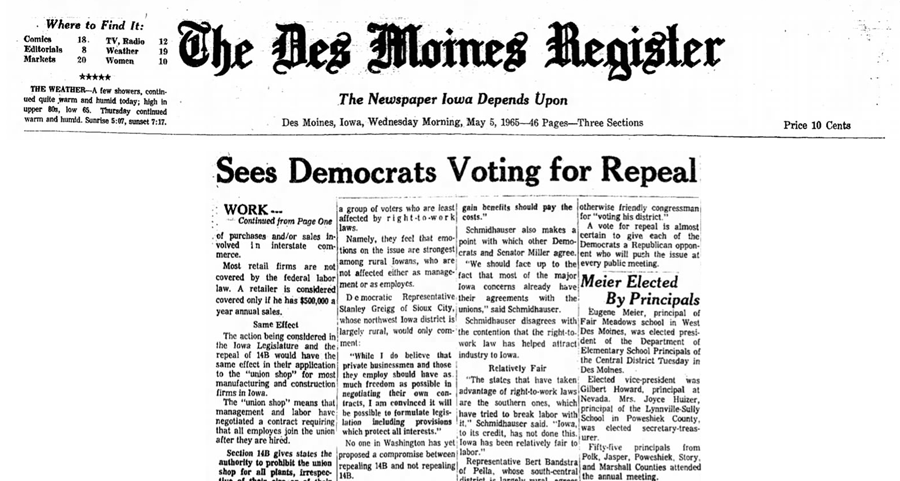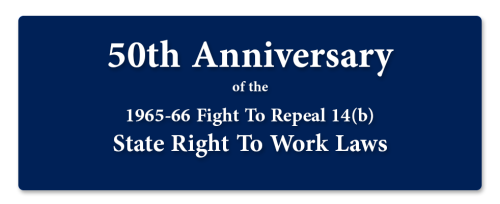According to Mr. Simunich, he had a voluntary union, and the union responded to its members because they could always leave. When the union was replaced with a compulsory dues union, the new union officers did not care about the employees and were not responsive to their needs. Union bosses seemed only concerned with the forced dues agreement with the employer. When Mr. Simunich sought the NLRB’s help, the NLRB took the union’s side and ignored the law.
I am Bernard Simunich. Up to last week, I was a charter member of local 1199, Chicago, IUE. I have been unionized and NLRBized out of a job and my right to work. I thank the chairman and the committee for the privilege of testifying.
This testimony will show that union security of the individual worker can best be had in a voluntary union, in which a membership card is a worker’s sign of distinction, and more than just a right to work. It also shows that security, for union officials lies in a compulsory union.
This testimony will show that union security of the individual worker can best be had in a voluntary union, in which a membership card is a worker’s sign of distinction, and more than just a right to work. It also shows that security, for union officials lies in a compulsory union.
“What I say here is substantiated by minutes from grievance meetings, NLRB letters, Justice Department letters, records from the Circuit Court of Cook County, court reporter transcripts, a union legal admission of criminal conspiracy to defeat the act, miscellaneous papers signed by union stewards, chief stewards, assistant chief stewards, management letters, and other management documents.
In our 1948 voluntary union the worker’s rights to job security under the union constitution were best protected on a “do-it-ourselves” basis; so that most of our troubles with union representation stopped almost as soon as trouble began; because for example, if union officials betrayed the union constitution by failing to process a grievance, we would talk about stopping the payment of dues as a corrective action.
The threat of withdrawing from the union was enough to insure better concern over the union membership.
To that extent, we controlled our officials. “We never had such a basic problem as a refusal to process a grievance.
In 1950, it was different after the men voted in the compulsory union with automatic collection of dues for the union by the company. I talked against compulsion and went on record against it. I refused to join the union.
Finally, the company and union called me into the office and told me that if l didn’t join the union immediately, I lost my right to work. It was a shotgun union which turned the union gentry into tall men, and made shadows out of the worker.
Once compulsion was established, the same union officials openly tolerated the company’s violations of the labor agreement. Relief through grievance procedure was more uncertain. The threat of withdrawing from the union was useless because that meant the loss of their right to work. Compulsion gave company and union the chance to discipline any worker who disagreed with them.
On June 2, 1952, the officer of the day wrote a Taft-Hartley charge in my name against company and union for refusal to process the grievance. He assured me that the grievance would have to be processed.
The case was turned over to Lawyer-Investigator I. M. Lieberman who repeated that assurance to me.
Ten weeks later the NLRB advised me that my charges were dismissed because there was “insufficient evidence” of violations. My repeated appeals to “Washington NLRB were so useless that I wondered if my letters to Mr. Lieberman and Director Ross Madden were actually in the file sent to Washington on appeal. The files were secret and no information was given me – except unbelievable explanations of the meaning of the simple worded Section 9(a).
In October 1957, the chief steward who threatened to expel me from the union in 1954 now gave me a legal admission that the grievance meeting of July 25, 1952, was faked to prevent a hearing of my grievance. That John Farrell, president of the local, collaborated, and that the other two members of the union grievance committee had no knowledge of the hearing.
Since 1952, I had been corresponding, with IUE President James D. Carey, seeking an investigation of the local and the district. He has never been willing to carry out his constitutional duties in that respect.
Our 1950-60 labor contract allowed layoff outside of seniority. Although I was the last remaining man in my job classification and somebody had to do my work, union and company decided to lay me off because, they said, my workload was diminishing. I protested, but the contract was brought out and I had to accept layoff.
About January 1, 1965, I found out that the company had given my job to somebody else. I filed a grievance which was ignored by both union and company.
I then filed Taft-Hartley charges under section 9(a) of the act; and got the usual turn-down from Director Ross Madden of the NLRB.
The Director of Appeals in Washington advised me just last week that union and company drew up a new labor contract after my layoff which took away my right to recall and my right to work.
All of this indicates how little union security the workman has under NLRB protection; and how necessary it is for all States to have Right to Work laws.
In 1952, I called the late Senator Taft’s attention to the outrageous interpretations the NLRB has given to section 9(a) of the act. In his reply, he stated that “the act was not getting sympathetic administration.” (Click here to read the full statement)
During the 50th Anniversary of the Battle to Repeal Taft-Hartley Section 14(b), the National Right to Work Committee is publishing a series of posts from the battle to remind America of how close an all-out attempt by Big Labor and their cronies in Congress and the White House came to ending Right to Work protections by repealing Taft-Hartley Section 14(b) which federally codified states’ rights to pass Right to Work laws.
 Statement of Bernard Simunich former charter member of Local 1199, Chicago, IUE before the U.S. House of Representatives’ Special Subcommittee on Labor. Below, a union member describes how powerless he was without Right to Work, and he describes NLRB as an agent of Big labor and employers, not an agent for the employee.
Statement of Bernard Simunich former charter member of Local 1199, Chicago, IUE before the U.S. House of Representatives’ Special Subcommittee on Labor. Below, a union member describes how powerless he was without Right to Work, and he describes NLRB as an agent of Big labor and employers, not an agent for the employee.


